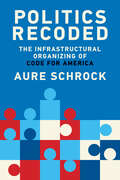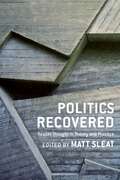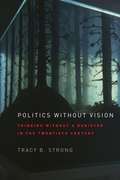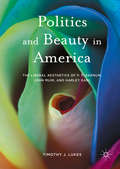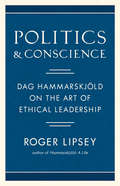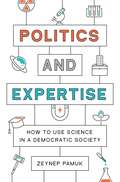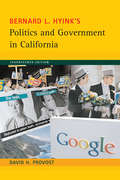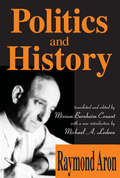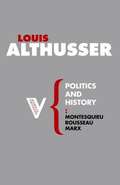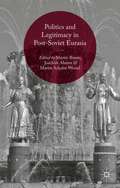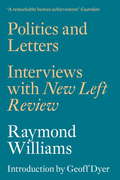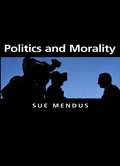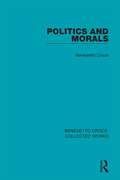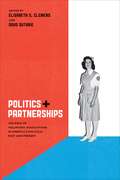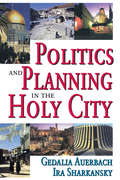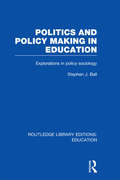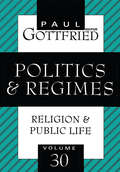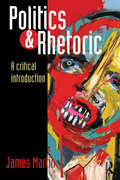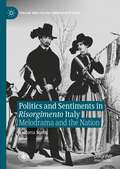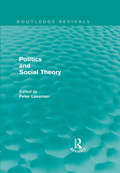- Table View
- List View
Politics Hacks (Hacks Ser.)
by Julian FlandersUnderstanding the history and significance of today's political climate can be confusing and daunting. Politics Hacks is here to give you quick definitions and background on 100 key political theories from the last 1,000 years.Each idea is broken down into three stages:1/ The helicopter view, which gives you an introduction to the idea, and some context around it. 2/ The shortcut, which gives you the core elements of the theory, along with a range of examples that everyone can understand. 3/ The hack, which is a one-liner designed to stick in your memory and give you an instant grasp of the concept.Whether you quickly want to get to grips with globalization, understand the Electoral College, or understand post-truth politics, this book is the perfect way to speedy enlightenment.
Politics Hacks (Hacks)
by Julian FlandersUnderstanding the history and significance of today's political climate can be confusing and daunting. Politics Hacks is here to give you quick definitions and background on 100 key political theories from the last 1,000 years.Each idea is broken down into three stages:1/ The helicopter view, which gives you an introduction to the idea, and some context around it. 2/ The shortcut, which gives you the core elements of the theory, along with a range of examples that everyone can understand. 3/ The hack, which is a one-liner designed to stick in your memory and give you an instant grasp of the concept.Whether you quickly want to get to grips with globalization, understand the Electoral College, or understand post-truth politics, this book is the perfect way to speedy enlightenment.
Politics Of Friendship (Radical Thinkers #Vol. 5)
by Jacques Derrida George Collins"O, my friends, there is no friend." The most influential of contemporary philosophers explores the idea of friendship and its political consequences, past and future. Until relatively recently, Jacques Derrida was seen by many as nothing more than the high priest of Deconstruction, by turns stimulating and fascinating, yet always somewhat disengaged from the central political questions of our time. Or so it seemed. Derrida's "political turn," marked especially by the appearance of Specters of Marx, has surprised some and delighted others. In The Politics of Friendship Derrida renews and enriches this orientation through an examination of the political history of the idea of friendship pursued down the ages. Derrida's thoughts are haunted throughout the book by the strange and provocative address attributed to Aristotle, "my friends, there is no friend" and its inversions by later philosophers such as Montaigne, Kant, Nietzsche, Schmitt and Blanchot. The exploration allows Derrida to recall and restage the ways in which all the oppositional couples of Western philosophy and political thought--friendship and enmity, private and public life--have become madly and dangerously unstable. At the same time he dissects genealogy itself, the familiar and male-centered notion of fraternity and the virile virtue whose authority has gone unquestioned in our culture of friendship and our models of democracy The future of the political, for Derrida, becomes the future of friends, the invention of a radically new friendship, of a deeper and more inclusive democracy. This remarkable book, his most profoundly important for many years, offers a challenging and inspiring vision of that future.
Politics Recoded: The Infrastructural Organizing of Code for America (The Information Society Series)
by Aure SchrockThe first detailed history of Code for America that examines how democratically designed government systems can collectively improve technology&’s impact on society.For decades, tens of thousands of volunteers and employees of Code for America have taken a different path to institutional change: through designing and implementing infrastructure. In Politics Recoded, Aure Schrock employs a robust, organizational ethnography to analyze how Code for America&’s infrastructural organizing changed how politics get exercised, showing how we citizens can work directly with the government on projects to improve our collective livelihoods. Drawing from theories of organizing, social infrastructure, racialized organizations, technical cultures, and intersectionality, Schrock argues that our &“post-techlash society&” must no longer presume that corporate platforms or social networks can level social inequities.An underrecognized yet influential organization, Code for America emerged from a tech culture background that prioritized networks and publicity over the long, slow work of institutional change. But its evolution demonstrates how to push beyond the fundamental flaws of tech-forward organizing. This, the first history of Code for America, shows how promoting agentic citizenship and brokering in empathy let the organization influence policy at all levels of government—and demonstrates why we need to bolster institutions to ensure that everyone is justly represented and receiving the benefits. Appealing to those in political science, communication, and information studies, Politics Recoded will empower practitioners and activists to revolutionize technological design and participate in alternative forms of civic engagement.
Politics Recovered: Realist Thought in Theory and Practice
by David Owen Richard Bellamy Michael Freeden Duncan Bell William A. Galston Glen Newey Rahul Sagar Mark Philp Charles Larmore John Medearis Elizabeth Frazer Matt Sleat Alison McQueen Paul Sagar William ScheuermanIs political theory political enough? Or does a tendency toward abstraction, idealization, moralism, and utopianism leave contemporary political theory out of touch with real politics as it actually takes place, and hence unable to speak meaningfully to or about our world? Realist political thought, which has enjoyed a significant revival of interest in recent years, seeks to avoid such pitfalls by remaining attentive to the distinctiveness of politics and the ways its realities ought to shape how we think and act in the political realm.Politics Recovered brings together prominent scholars to develop what it might mean to theorize politics “realistically.” Intervening in philosophical debates such as the relationship between politics and morality and the role that facts and emotions should play in the theorization of political values, the volume addresses how a realist approach aids our understanding of pressing issues such as global justice, inequality, poverty, political corruption, the value of democracy, governmental secrecy, and demands for transparency. Contributors open up fruitful dialogues with a variety of other realist approaches, such as feminist theory, democratic theory, and international relations. By exploring the nature and prospects of realist thought, Politics Recovered shows how political theory can affirm reality in order to provide meaningful and compelling answers to the fundamental questions of political life.
Politics Without Vision: Thinking Without a Banister in the Twentieth Century
by Tracy B. StrongFrom Plato through the nineteenth century, the West could draw on comprehensive political visions to guide government and society. Now, for the first time in more than two thousand years, Tracy B. Strong contends, we have lost our foundational supports. In the words of Hannah Arendt, the state of political thought in the twentieth and twenty-first centuries has left us effectively "thinking without a banister. " Politics without Vision takes up the thought of seven influential thinkers, each of whom attempted to construct a political solution to this problem: Nietzsche, Weber, Freud, Lenin, Schmitt, Heidegger, and Arendt. None of these theorists were liberals nor, excepting possibly Arendt, were they democrats--and some might even be said to have served as handmaidens to totalitarianism. And all to a greater or lesser extent shared the common conviction that the institutions and practices of liberalism are inadequate to the demands and stresses of the present times. In examining their thought, Strong acknowledges the political evil that some of their ideas served to foster but argues that these were not necessarily the only paths their explorations could have taken. By uncovering the turning points in their thought--and the paths not taken--Strong strives to develop a political theory that can avoid, and perhaps help explain, the mistakes of the past while furthering the democratic impulse. Confronting the widespread belief that political thought is on the decline, Strong puts forth a brilliant and provocative counterargument that in fact it has endured--without the benefit of outside support. A compelling rendering of contemporary political theory, Politics without Vision is sure to provoke discussion among scholars in many fields.
Politics and Beauty in America
by Timothy J. J. LukesThis book holds classical liberalism responsible for an American concept of beauty that centers upon women, wilderness, and machines. For each of the three beauty components, a cultural entrepreneur supremely sensitive to liberalism's survival agenda is introduced. P. T. Barnum's exhibition of Jenny Lind is a masterful combination of female elegance and female potency in the subsistence realm. John Muir's Yosemite Valley is surely exquisite, but only after a rigorous liberal education prepares for its experience. And Harley Earl's 1955 Chevrolet Bel Air is a dreamy expressionist sculpture, but with a practical 265 cubic inch V-8 underneath. Not that American beauty has been uniformly pragmatic. The 1950s are reconsidered for having temporarily facilitated a relaxation of the liberal survival priorities, and the creations of painter Jackson Pollock and jazz virtuoso Ornette Coleman are evaluated for their resistance to the pressures of pragmatism. The author concludes with a provocative speculation regarding a future liberal habitat where Emerson's admonition to attach stars to wagons is rescinded.
Politics and Conscience: Dag Hammarskjold on the Art of Ethical Leadership
by Roger LipseyAn accessible guide to the principles and vision of Dag Hammarskjöld, a man John F. Kennedy called "the greatest statesman of our century."Dag Hammarskjöld served as Secretary-General of the United Nations from 1953 until his tragic Dag Hammarskjöld served as secretary-general of the United Nations from 1953 until his tragic death in a suspicious plane crash in 1961. During those years he saw the fledgling international organization through numerous crises with skill that made him a star on the international stage. As readers of his now-classic diary, Markings, are aware, Hammarskjöld understood political leadership as an honor calling for resourcefulness, humility, moral clarity, and spiritual reflection.In this accessible handbook, acclaimed biographer Roger Lipsey details the political and personal code by which Hammarskjöld lived and made critical decisions. What emerges is the portrait of a man who struck a remarkable balance between patience and action, empathy and reserve, policy and people. Structured through short sections on themes such as courage, facing facts, and negotiation, Politics and Conscience offers a vision of ethical leadership as relevant today as it was in Hammarskjöld&’s time.
Politics and Cosmopolitanism in a Global Age (Ethics, Human Rights and Global Political Thought)
by Sonika Gupta Sudarsan PadmanabhanThis book offers a unique reconceptualization of cosmopolitanism. It examines several themes that inform politics in a globalized era, including global governance, international law, citizenship, constitutionalism, community, domesticity, territory, sovereignty, and nationalism. The volume explores the specific philosophical and institutional challenges in constructing a cosmopolitan political community beyond the nation state. It reorients and decolonizes the boundaries of ‘cosmopolitanism’ and questions the contemporary discourse to posit inclusive alternatives. Presenting rich and diverse perspectives from across the world, the volume will interest scholars and students of politics and international relations, political theory, public policy, ethics, and philosophy.
Politics and Expertise: How to Use Science in a Democratic Society
by Zeynep PamukA new model for the relationship between science and democracy that spans policymaking, the funding and conduct of research, and our approach to new technologiesOur ability to act on some of the most pressing issues of our time, from pandemics and climate change to artificial intelligence and nuclear weapons, depends on knowledge provided by scientists and other experts. Meanwhile, contemporary political life is increasingly characterized by problematic responses to expertise, with denials of science on the one hand and complaints about the ignorance of the citizenry on the other.Politics and Expertise offers a new model for the relationship between science and democracy, rooted in the ways in which scientific knowledge and the political context of its use are imperfect. Zeynep Pamuk starts from the fact that science is uncertain, incomplete, and contested, and shows how scientists’ judgments about what is significant and useful shape the agenda and framing of political decisions. The challenge, Pamuk argues, is to ensure that democracies can expose and contest the assumptions and omissions of scientists, instead of choosing between wholesale acceptance or rejection of expertise. To this end, she argues for institutions that support scientific dissent, proposes an adversarial “science court” to facilitate the public scrutiny of science, reimagines structures for funding scientific research, and provocatively suggests restricting research into dangerous new technologies.Through rigorous philosophical analysis and fascinating examples, Politics and Expertise moves the conversation beyond the dichotomy between technocracy and populism and develops a better answer for how to govern and use science democratically.
Politics and Government in California
by Bernard Hyink David ProvostPolitics and Government in California is an even-handed, comprehensive account of the organization and function of California state and local governments.Focusing on how state and local governments can most effectively address the challenges facing California today, the Seventeenth Edition is thoroughly updated to include the most recent data and events.
Politics and History
by Ron ChristensonRaymond Aron, French scholar, journalist, philosopher, sociologist, and historian, is internationally recognized as one of the great thinkers in the modern social sciences, bringing to contemporary history the insights of both philosophy and social science. This edition focuses on Aron's lifelong attempt to bridge the gap between knowledge and action and to understand the dialectical relationship between history and politics. It is an indispensable introduction to one of the most important thinkers of our century.This volume also contains an introduction by Aron, which presents an autobiographical account of his confrontation with many of the most important ideas of this century. Miriam Bernheim Conant provides perceptive commentary as well as a chronology of Aron's career and works.
Politics and History: Montesquieu, Rousseau, Marx
by Louis Althusser Ben BrewsterIn the first two essays of this book, Louis Althusser analyses the work of two of the greatest thinkers of the Enlightenment – Montesquieu and Rousseau. He shows that although they made considerable advances towards establishing a science of politics, particularly in comparison with the theorists of natural law, they nevertheless remained the victims of the ideologies of their day and class. Montesquieu accepted as given the political notions current in French absolutism; Rousseau attempted to impose by moral conversion an already outdated mode of production. The third essay examines Marx's relationship to Hegel and elaborates on the discussions of this theme in Althusser's earlier books, For Marx and Lenin and Philosophy. Althusser argues that Marx was able to establish a theory of historical materialism and the possibility of a Marxist philosophy of dialectical materialism not simply by turning his back on Hegel, but by extracting and converting certain categories from Hegel's Logic and applying them to English political economy and French socialist political theory.
Politics and Legitimacy in Post-Soviet Eurasia
by Martin Brusis Joachim Ahrens Martin Schulze WesselPolitical legitimacy has become a scarce resource in Russia and other post-Soviet states. Their capacity to deliver prosperity has suffered from economic crisis, war in Ukraine and confrontation with the West. Will nationalism and repression enable political regimes to survive? This book studies the politics of legitimation in Post-Soviet Eurasia.
Politics and Letters
by Geoff Dyer Raymond WilliamsRaymond Williams made a central contribution to the intellectual culture of the Left in the English-speaking world. He was also one of the key figures in the foundation of cultural studies in Britain, which turned critical skills honed on textual analysis to the examination of structures and forms of resistance apparent in everyday life. Politics and Letters is a volume of interviews with Williams, conducted by New Left Review, designed to bring into clear focus the major theoretical and political issues posed by his work. Introduced by writer Geoff Dyer, Politics and Letters ranges across Williams's biographical development, the evolution of his cultural theory and literary criticism, his work on dramatic forms and his fiction, and an exploration of British and international politics.From the Trade Paperback edition.
Politics and Morality
by Susan MendusPublic disenchantment with politics has become a key feature of the world in which we live. In this book, Susan Mendus asks if politicians can be morally good or whether politics is destined to involve dirty hands or the loss of integrity, as many modern philosophers claim.
Politics and Morals (Collected Works)
by Benedetto CroceOriginally published in 1946, this book reveals Croce’s dynamic conception of liberty, liberalism and the relation of individual morality to the State. The State which he discusses is more than a national government; it is a historical conception which takes in all ‘states’ - local and international. The volume provides an inspired analysis of the relation of politics and morals, individual liberty, free enterprise and pragmatic social judgement.
Politics and Partnerships: The Role of Voluntary Associations in America's Political Past and Present
by Doug Guthrie Elisabeth S. ClemensExhorting people to volunteer is part of the everyday vocabulary of American politics. Routinely, members of both major parties call for partnerships between government and nonprofit organizations. These entreaties increase dramatically during times of crisis, and the voluntary efforts of ordinary citizens are now seen as a necessary supplement to government intervention. But despite the ubiquity of the idea of volunteerism in public policy debates, analysis of its role in American governance has been fragmented. Bringing together a diverse set of disciplinary approaches, Politics and Partnerships is a thorough examination of the place of voluntary associations in political history and an astute investigation into contemporary experiments in reshaping that role. The essays here reveal the key role nonprofits have played in the evolution of both the workplace and welfare and illuminate the way that government’s retreat from welfare has radically altered the relationship between nonprofits and corporations.
Politics and Planning in the Holy City
by Gedalia Auerbach Ira SharkanskyJerusalem is not just another city that illustrates the conflict between interests of professional planners and competing political perspectives. It is the Holy City, with a history of some 3,000 years. Moreover, numerous layers of historical remains have importance for intense and competitive religious and national interests. Israelis claim it as the capital of their country, and Palestinians want it--or part of it--as the capital of their not yet created state.Jerusalem is also a place where more than 700,000 people live, and the center of a metropolitan area with more than twice that number. Along with religious and national interests, there are the customary conflicts between what various groups--property developers, politicians, professional planners, neighborhood residents, and environmental activists--want to do with the land. Politics and Planning in the Holy City describes and analyzes the tensions between politics and planning.The authors tackle the economic, social, and political contexts that shape conflicts. Such problems include deciding what should be called Jerusalem and difficulties surrounding the construction of a defense barrier to protect Israelis from Palestinian terrorists--in the framework of a multicultural city where 30 to 40 percent of its residents are Palestinians. There is dissent over locating rail lines to the city, as some interests want them here, there, or nowhere, and over building a light rail line within a city already crowded and beset with conflicting interests. The creation of a football stadium is another venue for conflict, as many religious Jews view sports as a threat to their way of life.Issues include locating a site for housing new immigrants, as few Jerusalemites want large numbers of newcomers in their neighborhoods, and deciding which sites merit preservation in a city with many deserving candidates, but severely limited resources. This volume will attract urban specialists as well as those concerned with larger p
Politics and Policies in the Debate on Euthanasia: Morality Issues in Portugal
by Inês Santos Almeida Luís F. MotaThis book analyses the political and public debates about euthanasia in Portugal. Utilising petitions submitted to Parliament, legislative bills, parliamentary debates, opinion articles in newspapers, and documents published by the Catholic Church, it examines this sensitive issue through the theoretical lens of morality politics. It does so by studying the process of political dispute between advocacy coalitions formed by political parties and societal actors. This is the first book to comprehensively analyse a morality issue in Portugal, a predominantly Catholic country that has taken an innovative and liberal stance on many morality issues over the last two decades. It will appeal to students and scholars of sociology, political science, public policy and bioethics, as well as policymakers and other interest groups.
Politics and Policy Making in Education: Explorations in Sociology (Routledge Library Editions: Education)
by Stephen J. BallBased on interviews with key actors in the policy-making process, this book maps the changes in education policy and policy making in the Thatcherite decade. The focus of the book is the 1988 Education Reform Act, its origins, purposes and effects, and it looks behind the scenes at the priorities of the politicians, civil servants and government advisers who were influential in making changes. Using direct quotations from senior civil servants and former secretaries of state it provides a fascinating insight into the way in which policy is made. The book focuses on real-life political conflicts, examining the way in which education policy was related to the ideal of society projected by Thatcherism. It looks in detail at the New Right government advisers and think tanks; the industrial lobby, addressing issues such as the National Curriculum, national testing and City Technical Colleges. The author sets these important issues within a clear theoretical framework which illuminates the whole process of policy making.
Politics and Regimes (Religion And Public Life Ser. #No. 30)
by Paul GottfriedThe essays grouped together in this volume look from differing angles at the crisis of condence faced by the contemporary state. What we see is the decline of the authority once associated with the Western nation-state as a source of public order and as a defender of cultural identity. Multiplying and contradictory rights claims, the breakdown of a shared political frame of reference, and attempts by public administration to micromanage society have all contributed to the threat to authority. What remains to be asked is whether the Western paradigm of the state can be restored to the basis of public faith.
Politics and Rhetoric: A Critical Introduction
by James MartinRhetoric is the art of speech and persuasion, the study of argument and, in Classical times, an essential component in the education of the citizen. For rhetoricians, politics is a skill to be performed and not merely observed. Yet in modern democracies we often suspect political speech of malign intent and remain uncertain how properly to interpret and evaluate it. Public arguments are easily dismissed as ‘mere rhetoric’ rather than engaged critically, with citizens encouraged to be passive consumers of a media spectacle rather than active participants in a political dialogue. This volume provides a clear and instructive introduction to the skills of the rhetorical arts. It surveys critically the place of rhetoric in contemporary public life and assesses its virtues as a tool of political theory. Questions about power and identity in the practices of political communication remain central to the rhetorical tradition: how do we know that we are not being manipulated by those who seek to persuade us? Only a grasp of the techniques of rhetoric and an understanding of how they manifest themselves in contemporary politics, argues the author, can guide us in answering these perennial questions. Politics and Rhetoric draws together in a comprehensive and highly accessible way relevant ideas from discourse analysis, classical rhetoric updated to a modern setting, relevant issues in contemporary political theory, and numerous carefully chosen examples and issues from current politics. It will be essential reading for all students of politics and political communications.
Politics and Sentiments in Risorgimento Italy: Melodrama and the Nation (Italian and Italian American Studies)
by Carlotta SorbaThis book investigates the narrative of nationhood during the Italian Risorgimento and its ability to reach a new and wider audience. In Italy, an extraordinary emotional excitement pervaded the struggle for national independence, suffusing the speeches and actions of patriots. This book shows how this ardour borrowed the tones, figures and spectacular nature of the melodramatic imagination feeding the theatre and literature of the time, and how it could resonate with a largely uneducated audience. An important contribution to the new historiography on the Italian Risorgimento and on nineteenth-century nationalism in Europe, it offers a fresh perspective on the public sphere during the Risorgimento, focusing on the transnational links between political mobilisation and the growth of new media and burgeoning mass culture.
Politics and Social Theory (Routledge Revivals)
by Peter LassmanFirst published in 1989, this Routledge Revival is a major collection of essays on the competing traditions of social and political theory. The contributions, by international scholars, reflect the re-examination of the boundaries between the ‘political’ and the ‘social’, the ‘public’ and ‘private’, and ‘state’ and ‘society’. The reissue will be of great value to students in both sociology and political science. Bringing new arguments to bear on the debate about the place of political theory in social science, the contributors discuss such issues as the different languages used by sociologists to describe the state; Marxist and socialist theory; class analysis; the welfare state; feminist political theory; and the impact of post-modernity on contemporary social thought.


